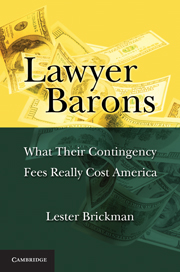Book contents
- Frontmatter
- Contents
- Foreword: Sorting Out Our National Liability Crisis by Richard A. Epstein
- Acknowledgments
- LAWYER BARONS
- Introduction
- 1 The Origin of the Contingency Fee
- 2 How Profitable Are Contingency Fees?
- 3 Are Contingency Fee Profits “Reasonable”?
- 4 How Tort Lawyers Have Increased Their Profits by Restraining Competition
- 5 Why the Market Has Failed to Correct the Absence of Price Competition
- 6 Impediments Imposed by the Bar to Price Competition
- 7 The Effects of Incentives Created by Contingency Fees
- 8 How the Quest for Profits Influenced the Development of the Tort System
- 9 Lawyers' Role in the Expansion of Tort Liability
- 10 The Role of the Judiciary in Tort System Expansion
- 11 Current and Future Expansions of Tort Liability
- 12 The “Litigation Explosion”
- 13 Measures of the Rate of Expansion of Tort Liability
- 14 The Relationship between Injury Rates and Tort System Costs
- 15 The Impacts of Substantial Increases in Tort Lawyers' Effective Hourly Rates
- 16 Class Actions
- 17 Fees in Class Actions
- 18 How Class Action Lawyers Game Fee Setting
- 19 Securities Class Actions
- 20 Regulation through Litigation
- 21 A New Role for Punitive Damages
- 22 For-Profit Partnerships between State Attorneys General and Contingency Fee Lawyers
- Conclusion
- Appendix A A Critique of Alex Tabarrok
- Appendix B Calculating Tort Lawyers' Effective Hourly Rates in 1960
- Appendix C Electronic Discovery and the Use of Contract Lawyers
- Appendix D The HMO Litigation
- Appendix E The GM “Side Saddle” Truck Litigation
- Appendix F Modern Class Actions Undermine Democratic Precepts
- Appendix G Other Ways Lawyers Game Class Action Fees
- Appendix H Nonrecourse Financing of Tort Litigation
- Appendix I Political Contributions by Tort Lawyers and the U.S. Chamber of Commerce
- Appendix J Special Rules Favoring Lawyers
- Appendix K The Ultimate Medical Expense “Buildup”: Whiplash
- Appendix L The Effect of Punitive Damages on Compensatory Awards
- Index
Appendix L - The Effect of Punitive Damages on Compensatory Awards
Published online by Cambridge University Press: 05 June 2012
- Frontmatter
- Contents
- Foreword: Sorting Out Our National Liability Crisis by Richard A. Epstein
- Acknowledgments
- LAWYER BARONS
- Introduction
- 1 The Origin of the Contingency Fee
- 2 How Profitable Are Contingency Fees?
- 3 Are Contingency Fee Profits “Reasonable”?
- 4 How Tort Lawyers Have Increased Their Profits by Restraining Competition
- 5 Why the Market Has Failed to Correct the Absence of Price Competition
- 6 Impediments Imposed by the Bar to Price Competition
- 7 The Effects of Incentives Created by Contingency Fees
- 8 How the Quest for Profits Influenced the Development of the Tort System
- 9 Lawyers' Role in the Expansion of Tort Liability
- 10 The Role of the Judiciary in Tort System Expansion
- 11 Current and Future Expansions of Tort Liability
- 12 The “Litigation Explosion”
- 13 Measures of the Rate of Expansion of Tort Liability
- 14 The Relationship between Injury Rates and Tort System Costs
- 15 The Impacts of Substantial Increases in Tort Lawyers' Effective Hourly Rates
- 16 Class Actions
- 17 Fees in Class Actions
- 18 How Class Action Lawyers Game Fee Setting
- 19 Securities Class Actions
- 20 Regulation through Litigation
- 21 A New Role for Punitive Damages
- 22 For-Profit Partnerships between State Attorneys General and Contingency Fee Lawyers
- Conclusion
- Appendix A A Critique of Alex Tabarrok
- Appendix B Calculating Tort Lawyers' Effective Hourly Rates in 1960
- Appendix C Electronic Discovery and the Use of Contract Lawyers
- Appendix D The HMO Litigation
- Appendix E The GM “Side Saddle” Truck Litigation
- Appendix F Modern Class Actions Undermine Democratic Precepts
- Appendix G Other Ways Lawyers Game Class Action Fees
- Appendix H Nonrecourse Financing of Tort Litigation
- Appendix I Political Contributions by Tort Lawyers and the U.S. Chamber of Commerce
- Appendix J Special Rules Favoring Lawyers
- Appendix K The Ultimate Medical Expense “Buildup”: Whiplash
- Appendix L The Effect of Punitive Damages on Compensatory Awards
- Index
Summary
In recent years, tort lawyers have succeeded in establishing a “bad faith” cause of action against insurance companies for their failure to offer to settle certain tort claims for policy limits brought against their insured. In these litigations, large punitive damages or their functional equivalents have been assessed against insurance companies for their failure to offer policy limits. This has a dual effect. First, it directly enriches tort lawyers. Second, insurance companies, fearful of punitive damages awards if they fail to make substantial settlement offers, are more likely to offer higher settlements, even when they do not believe the claim merits such an offer.
Punitive damages amounting to tens of millions of dollars have also been awarded against medical insurers and HMOs for failing to cover “experimental” treatments for life-threatening conditions. For example, a jury awarded $77 million in punitive damages to a family of a woman who died after an HMO denied her the ability to undergo an experimental bone marrow transplant. In another case, a jury rendered a $116 million punitive damages award for an “HMO's refusal to authorize payment for an expensive, state-of-the-art treatment for terminal cancer that the HMO considered to be experimental.” No doubt, some medical insurers' denials of coverage have more to do with financial self-interest than with the medical appropriateness of the course of treatment.
- Type
- Chapter
- Information
- Lawyer BaronsWhat Their Contingency Fees Really Cost America, pp. 545 - 548Publisher: Cambridge University PressPrint publication year: 2011



